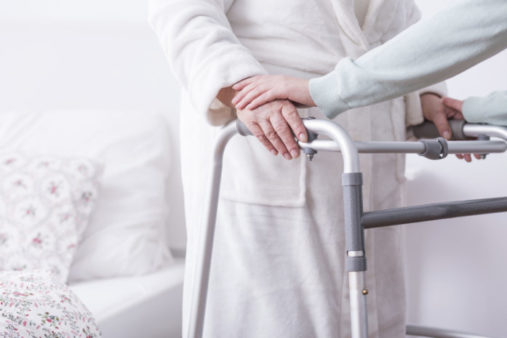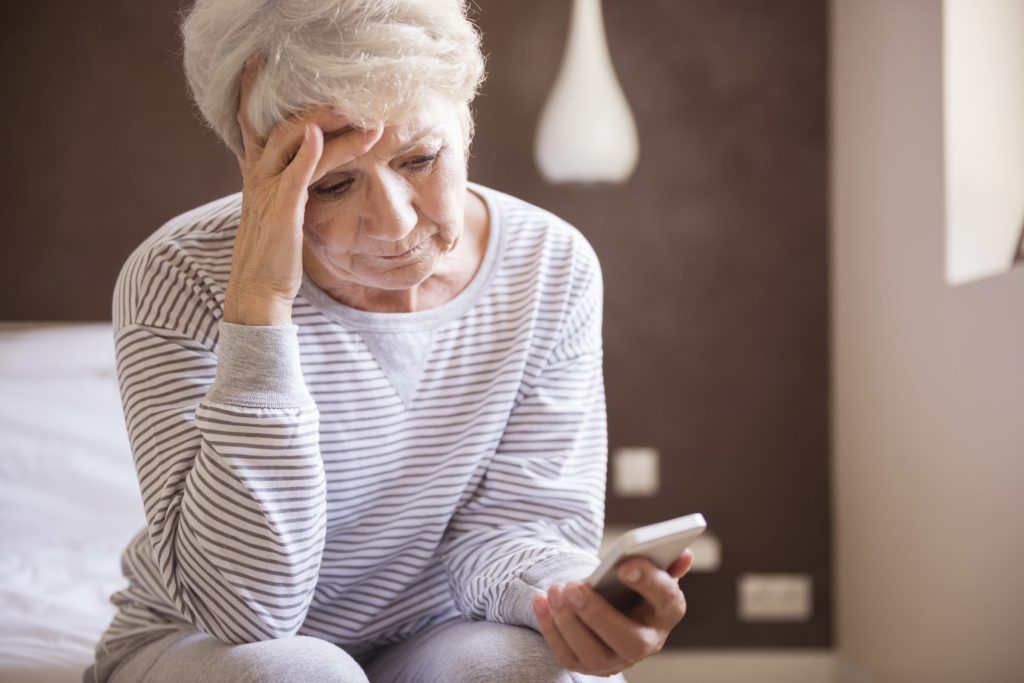The Centers for Disease Control and Prevention (CDC) reports: one out of three adults aged 65 years and older fall every year in the US. As we age, our ability to bounce back from a major injury significantly diminishes. A few days in the hospital can cost precious muscle strength, and mobility. Fall prevention is an essential component for maintaining adult independence.
One fall is a strong indication that more falls are likely. Many seniors experience a regular cycle of falls and hospitalizations until they can no longer remain safely at home. According to the San Diego County Department of Health and Human Services, 7 older San Diegans are expected to die from falls every day in 2030 if there are no changes to current fall trends. Creating a safe living space, getting the appropriate tools, and lining up caregiver support all ensure an environment of fall prevention.
2. Maintain and Build Strength and Balance
As we age we naturally lose muscle mass and flexibility. But, that doesn’t mean we can’t fight to win it back. Staying active, and focussing on appropriate strength exercises can help seniors remain strong, independent, and upright. Even if your loved one has already experienced a reduction in strength and balance it is never too late to speak with your doctor about doing more. Fall prevention is about maintaining proper form and stamina. Strength and balance are very much use it or lose it skills, especially as you age. If you or your loved one feel weakness or balance issues try adding a few of the following activities to your routine ( with your doctor’s permission of course):
- Go for a daily walk with friends or your dog
- Join a yoga class
- Body appropriate weight training
- Medicare reimbursed physical therapy support
- Water based activities
- Bed and chair exercises
There are so many ways to maintain strength and balance for fall prevention! Find one that fits you or your loved one and get moving!
2. Practice Medication and Health Management
Side effects for miss-management of medications and chronic health issues contribute to the high fall rates in San Diego county. If you or your loved one often miss medication doses, it may be time to enlist outside help to ensure medications are properly dosed. Conditions like fluctuating in blood pressure or unmanaged diabetes can cause dizziness and may contribute to falls. There are many health issues that affect the senior community. If you notice a medical condition is contributing to the weakness or instability of a loved one, you should bring it up to his doctor. Sometimes changing medications or making lifestyle modifications can greatly reduce the incidence of falls. Even something as simple as drinking more fluids and eating more nutritious, health appropriate meals can do a lot for fall prevention.
3. Use Assistive Devices Correctly
Have you ever seen a person carry a cane like an umbrella rather than the assistive walking device it is? Yep – it happens all the time. Sometimes, people don’t like the mental stigma they feel goes along with walkers, wheelchairs, and canes. It is important your loved one feel comfortable using whatever assistive device is most appropriate for his needs. If you or your loved one need help using assistive devices, the doctor is a good place to start. Doctors can order therapy services. Home health physical therapists can work with a patient to get the most out of an assistive device.
4. Bring in a Caregiver to Help with High Fall Risk Activities
Bathrooms are high fall areas. Bringing in a caregiver can help with fall prevention, especially during tasks like bathing and using the restroom. If your loved one is repeatedly falling at night or when showering there is a good indication you can help reduce falls by hiring support during those times. Caregivers can also assist with nutrition and medication support. They can offer a level of oversight on critical tasks to help with fall prevention. If you are interested in finding out more about San Diego Home Care, check out this article.
San Diego Home Care – Everything You Need to Know
5. Home safety modification
Take a look around your loved ones home. Most of the falls that occur in San Diego County are the result of slips trips and stumbles. Walkers and toes can get caught up on the edges of carpets and other obstacles in the walkway. Take a look along walking paths, and make sure there is lots of clearance so feet and assistive devices don’t get caught up. Adding grab bars in the shower area supports fall prevention. Make sure to look through the house for places your loved one might have trouble navigating. Steps in and out of the house can transform into ramps. First floor offices can convert to bedrooms to cut down on stairway risk. You can easily add chair lifts and bed rails to help a loved one navigate a cherished home.
The hardest part about fall prevention is getting used to necessary changes that support a safe environment. Talk to your loved one about the risks of taking no action. Take small steps to create big gains in mobility and independence. If your loved one has a history of falls, take immediate action and work together to make the environment one he can remain in safely for years to come!



